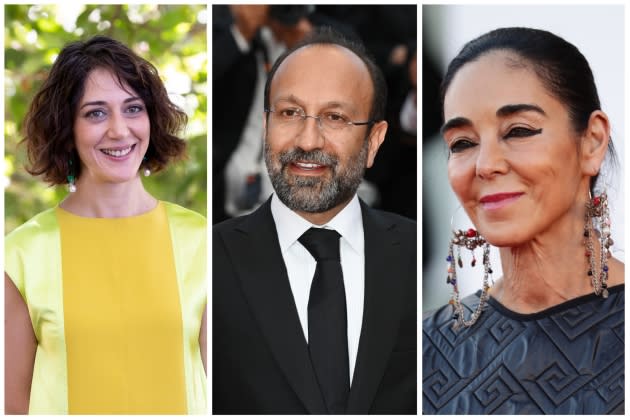Tehran Governor Warns Of Consequences For “Celebrities Who Fanned Flames” Of Iran Protests
- Oops!Something went wrong.Please try again later.

An Iranian government official has warned that action will be taken against celebrities who publicly show support for anti-government protests, sparked by the death of 22-year-old Mahsa Amini while in police custody.
These demonstrations have garnered an unprecedented level of public support from a number of prominent figures in Iran’s cultural, media and sporting spheres, who previously have not openly commented on the political situation in their country.
More from Deadline
Angelina Jolie Demands Freedom For Iranian Women As Protests Continue Following Death Of Mahsa Amini
WGA West's Middle Eastern Writers Committee Stands "In Solidarity" With Iranian Protesters
Mohsen Mansouri, governor of the province of Tehran, said the authorities would be dealing with “celebrities who fanned the flames of riots and with those who sign [lucrative] contracts with radio and television, but in a time of riots take a stand against security and order.”
“Of course, we may not deal with some cases immediately due to material reasons, but without a doubt we will deal with them after a few days and at the right time,” he was reported as saying by state news agency IRNA.
Over the weekend, Oscar-winning Iranian director Asghar Farhadi posted a video on his Instagram account asking the world to unite in solidarity of protestors.
It was an uncharacteristic move by the director, who has moved freely in and out of Iran until now, is currently attending the Zurich Film Festival as president of the jury.
Separately another group of Iranian cinema professionals penned an open letter decrying the actions of the authorities and voicing support for the protests.
Signatories included filmmakers Ali Abbasi (Holy Spider), Shirin Neshat (Land Of Dreams) and Bahman Ghobadi (The Four Walls) and Holy Spider Cannes best actress winner Zar Amir Ebrahimi.
Back in Iran, popular, award-winning actress Fatameh Motamed-Ayra defiantly took off her hijab at the high-profile funeral of actor Amin Tarokh, who passed away of heart failure, as she gave a eulogy in his honor.
#IranProtests2022 : Famous actress Fatemeh Motamed-Arya appears without hijab as she makes speech at funeral of fellow actor Amin Tarokh #فاطمه_معتمدآریا #مهسا_امینی #Mahsa_Amini pic.twitter.com/911wAe3bFe
— sebastian usher (@sebusher) September 28, 2022
Tehran province governor Mansouri’s warning echoes a veiled threat from Iranian Culture Minister Abbas Salehi earlier this week. He said that actresses publicly removing their hijabs should look for other work, implying they will no longer be allowed to exercise their profession.
Mansouri was speaking on the fringes of a commemoration ceremony at a religious shrine in the city of Safadasht, some 30 miles west of Tehran.
Referring to the protests as “riots”, Mansouri said the unrest had been contained in the last 24 hours. He blamed foreign influences for stoking the “riots” and said the authorities were now clamping down on the instigators.
The Iranian authorities have shut down the internet as they move to rein in the protests so it is difficult to verify whether Mansouri’s claims that demonstrations have been brought to an end are true.
Amini died on September 16 after being taken into police custody for not wearing her hijab in accordance with Iran’s religion-based law. Police say she died of a heart attack but eyewitnesses and people who were detained with the young woman said she was severely beaten.
As news of her death spread, spontaneous protests, often led by women who defiantly ripped off their hijabs, began to spread.
Human rights groups are reporting that at least 76 protestors have been killed so far, most of them by direct gunfire from security forces.
A number of local journalists, who had been reporting on the situation, have also been rounded up and detained, including Niloufar Hamedi, who first reported Amini’s injuries.
The protests come amid an increasingly oppressive rule by the government of President Ebrahim Raisi as it attempts to rein in growing discontent.
This anger has been stirred by a number of issues including the cost-of-living crisis, annoyance over government mismanagement of the country, and fatigue of the oppressive religion-based rule, especially among younger generations.
This has also led the government to clamp down on freedom of expression with the detention over the summer number of directors with a history of political dissent, including Mohammad Rasoulof, Mostafa Aleahmad and Jafar Panahi.
Best of Deadline
The Royals And Politicians Of 'The Crown' And The Actors Who Play Them — Photo Gallery
NFL 2022 Schedule: Primetime TV Games, Thanksgiving Menu, Christmas Tripleheader & More
Sign up for Deadline's Newsletter. For the latest news, follow us on Facebook, Twitter, and Instagram.

